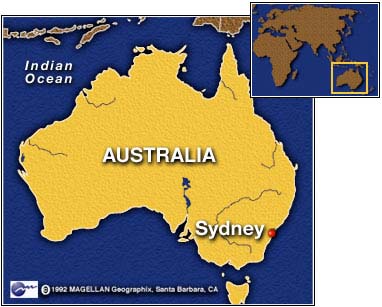Sydney basks in Earth Hour's global glow
 Sydney - Sydney Harbour lost a little of its twinkle Saturday as Earth Hour enthusiasts snuffed out lights to show their concern about the greenhouse gas emissions causing climate change.
Sydney - Sydney Harbour lost a little of its twinkle Saturday as Earth Hour enthusiasts snuffed out lights to show their concern about the greenhouse gas emissions causing climate change.
Earth Hour is a grassroots, Australian initiative now into its third year that asks people around the world to switch off lights for 60 minutes to pressure governments to act on slowing global warming.
The Opera House and Sydney's iconic Harbour Bridge clicked off at 8:30pm (0930 GMT), signalling the official start of Earth Hour.
The World Wildlife Fund (WWF) office in Sydney is chief organizer and calculates that 1 billion people in over 90 countries will dim their lights as different time zones take Earth Hour around the globe.
WWF Australia head Greg Bourne admitted the campaign would add to power consumption rather than reduce it because of all the promotional activities, like printing T-shirts, arranging concerts and holding candlelit dinners.
But he insisted that raising awareness of the dangers of heating up the planet was the goal, not a temporary reduction in emissions.
"It's the ongoing change that matters more than anything else," Bourne said. "It's symbolic. That's the bit that matters."
Organizers say taking an hour-long candlelit bath, or attending a gala "green-tie" ball, is all in the spirit of Earth Hour, which they describe as a party not a protest.
"For politicians to lead, they must be supported," Bourne said. "This is about creating a visual mandate for leaders to take long-term decisions."
He said he sees Earth Hour, which this week received the endorsement of the United Nations, as prodding governments ahead of the Global Climate Change Conference in Copenhagen in December, at which a successor to the UN-sponsored Kyoto Protocol is to be negotiated.
Describing the initiative as "the largest demonstration of pubic concern about climate change ever attempted," UN Secretary General Ban Ki-moon gave it the blessing of the world body.
Thousands of towns and cities will temporarily lose illumination - as will some of the world's best-known structures - the Empire State Building in New York, the Bird's Nest stadium in Beijing, the Petronas Towers in Kuala Lumpur, the pyramids near Cairo, the Vatican in Rome and Rio de Janeiro's statue of Christ.
WWF China director Yanli Hou said developing world participation showed that Earth Hour was putting pressure on politicians in poor countries and rich ones alike.
"For too long people have been saying that they can't tackle climate change until China and India do so too," she said. "The success of Earth Hour shows that the people of these countries are in fact ready and willing to take the lead on climate change."
Inevitably, Earth Hour has drawn criticism. "I'm worried it's just symbolic and doesn't go much beyond that," University of New South Wales environment lecturer Stephen Healy said.
There are also sneers that organizers vastly overstate participation. University of Chicago economist David Solomon, who studied the inaugural 2007 dimming, said claims that half of Sydney residents switched off were not consistent with electricity demand over the hour.
"Statistically speaking, Earth Hour appears to have been a complete flop," he concluded.
But environmentalists around the world are mostly in favour. "It's an important event, not for the amount of energy it saves, but for the awareness it raises and the pressure it puts on governments," said Beirut-based Wael Hmaidan, executive director of private sector group IndyAct.
Others argue that, whatever the savings, Earth Hour is good for business at a time of recession. Sydney's Taronga Zoo is expecting a full house for its Earth Hour gala dinner and a bicycle-powered concert in Melbourne is a sell out.
In Canada, an enthusiastic participant in Earth Hour, tills are also expected to jingle. Jeff Hanson, restaurant manager at the Four Seasons Hotel in Vancouver, told his local newspaper that last year's Earth Hour candlelit dinners had perked up the takings.
"It definitely was romantic," he said. "The bar was absolutely crazy. People came in and didn't want to leave." (dpa)